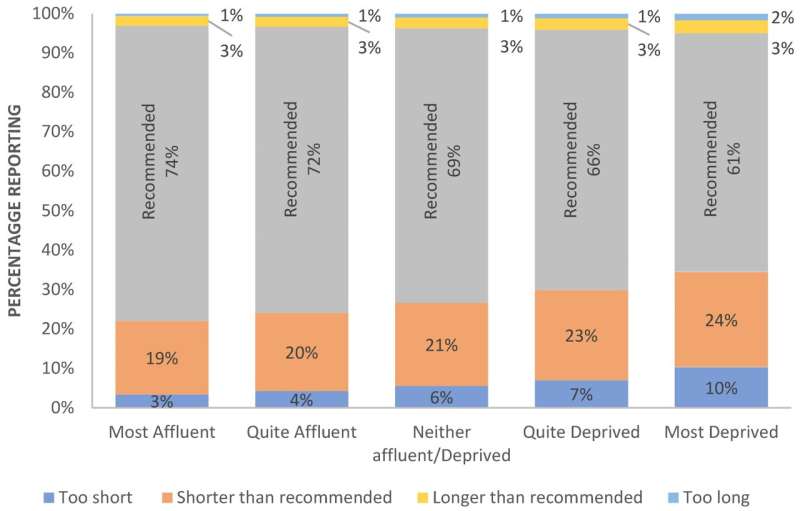This article has been reviewed according to Science X's editorial process and policies. Editors have highlighted the following attributes while ensuring the content's credibility:
fact-checked
trusted source
proofread
People living in deprived areas more likely to suffer from poor sleep

The study by psychologists at Nottingham Trent University (NTU) and the University of Roehampton explored UKBiobank data from around 500,000 people aged 40–69. They analyzed reports of sleep problems such as sleeping for too long or too little for their age; waking in the night; waking too early; snoring; daytime sleepiness; and difficulty getting going in the morning.
These were combined into a Problematic Sleep Index, allowing the individual and combined influence of a wide range of characteristics to be quantified. This was cross-referenced with personal wealth, including household income and property ownership; ethnic group; employment; education; and postcode-based social deprivation information.
The full paper, "Social Deprivation and Ethnicity are associated with more Problematic Sleep in middle aged and older adults," has been published in the journal Clocks & Sleep.
Almost one-third of participants reported sleeping shorter (24.7%) or longer (7.7%) than age-corrected recommended sleep durations—both of which are associated with increased risk of mortality. The incidence of shorter or longer sleep increased with social deprivation and varied with ethnicity.
The findings also showed that waking during the night, likelihood of sleeping during the day, difficulty of getting up in the morning, and snoring are all affected by the ethnicity of the respondent and the extent of social deprivation where they live.
White people (82.4%) considered it easier to get up in the morning compared with Black (74.4%), Asian (73.5%) or Mixed ethnicities (74.2%).
People living in deprived areas found it harder to get up in the morning, and were more likely to nap or doze during the daytime and wake in the middle of the night.
While being employed or retired is associated with better sleep, being unable to work or unemployed is not, and Black people and those living in deprived areas reported the worst sleep overall.
The best sleepers were seen to be male, younger, affluent, educated to degree level, living with others in the home they own and have lived in for some time, with a high income, multiple vehicles, and a long-term job.
Lead researcher and head of Sleep Well Science at NTU's School of Social Sciences, Professor John Groeger, said, "The sample size is sufficiently large to demonstrate that both social deprivation and ethnicity affect sleep quality independently of age, sex, personal wealth, employment, and education.
"The implications of these findings have relevance to better health, educational outcomes, and wealth creation and productivity as poor sleep causes all of these to be worse. Socially disadvantaged groups sleep worse, and this may be something we can 'level up.'
"We know we can improve sleep through education and intervention- and this research shows that targeting such interventions and education in particular geographic areas may the optimal use of scarce resource and expertise."
The Problematic Sleep Index which combines all of the sleep issues explored into a single measure, can be used by community health care teams to identify individuals and families living in locations within particular postal areas where targeted support for specific sleep problems may be needed.
More information: John A. Groeger et al, Social Deprivation and Ethnicity Are Associated with More Problematic Sleep in Middle-Aged and Older Adults, Clocks & Sleep (2023). DOI: 10.3390/clockssleep5030030





















